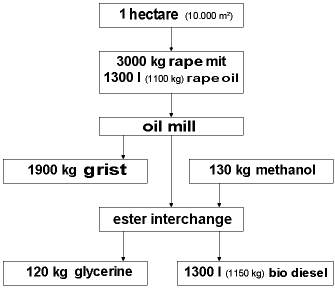|
|
Biologic Diesel Fuel

| 5 metric tons of biomass equal -> 1 metric ton of diesel oil |
| The reputation of biological diesel fuel has faded recently |
Biological diesel should actually be named 'Rapeseed methyl ester' (see above). Lately, its environmental friendliness is controversial. The fuel is extracted, in principle, from renewable raw materials which use up the
same amount of carbon dioxides for their growth as is generated during their combustion. However, the relatively bad efficiency makes its usage as fuel questionable. Taking the high prices for crude oil into consideration,
long transportation ways are economical, but the energy consumption for the complete transportation should be accounted for, actually. Growth potentials and profits are so tempting for some developing countries, e.g., for
palm oil, one possible raw material for the production of biological diesel, that forests are cleared without decent thoughts about the people and animals living there, often taking their living space away. This is exactly the
opposite of what we would like to accomplish by the usage of biological diesel.
| Not enough acreage, high subsidies, dangerous fertilization |
Biological diesel can not serve as the solution for our environmental problems. For a country like Germany, there is simply not enough acreage for the production of a substantial portion of the annual fuel need. If diesel is
once to contain 10% of biological diesel according to EU plans, this will be possible in Germany - with the present processes and surfaces - only with import. In addition, for the production of biological diesel - exactly like
with other fuels - at least 20% of fossil energy is needed. The subsidies for the farmers are very high. The losses for the state are softened somewhat in 2006 by the EU due to a tax on oil of 15 cents per liter. At the present
oil price biological diesel is not yet competitive. Another problem of biological diesel is that laughing gas evolves from the nitrogen fertilization which is still much more polluting than carbon dioxide. The energy insertion for
the production of biological diesel must still be reduced.
| Switching is easy, fewer exhaust gas pollutants |
The adjustments that are necessary for the car are limited, and sometimes the car producer is willing to do it against a low surcharge. For example, some wires need extra protection. The engine has slightly less power,
yet no sulfur connections in the exhaust gas any more. Generally, the emissions (particles, CH and HC) are reduced. In addition, oxygen is included, an advantage for a very clean combustion in the engine.
| Car producer's clearance is a problem |
Biological diesel is hygroscopic like brake fluid and works on varnished surfaces like a solvent. Operating the car with biological diesel must be explicitly
allowed by the manufacturer,
otherwise there is no guarantee in case of damages, e.g., for the fuel injection system, which can be expensive. The operation with pure biological diesel is not always without problems - not only in the winter period - with
vehicles of the newer diesel generation, even if they are released by the manufacturer. Therefore, e.g., VW has withdrawn its clearance and adaptation kit, and recently even forbids the usage of this fuel. Care is required
especially with summer-bio diesel in winter. At low temperatures it is anyways advisable to tank normal diesel oil or at least to add it, or to start the engine with diesel oil. Although the cetane number of biological oil is
higher, the heat value is slightly lower. This may imply up to 8% of additional fuel consumption.
| Biological diesel is very well suited as additive |
There is a future for biological diesel as additive; it is added to the normal diesel oil up to a maximum of 5%. It does make us
less dependent on the imported crude oil, promotes the home agriculture and probably contributes to the climate protection. Production and use of biological diesel raise the acceptance of synthetic fuels which are
substantially more promising in terms of efficiency.
| Unfortunately, hemp and the Coke shrub (for cocaine) do not grow under the same conditions as
rape; otherwise it might be possible to help also farmers in Coke-cultivations, having
them produce the raw material for biological diesel, supporting them and not the drug addiction. |
| At the moment (2007) the cultivation areas of this world might suffice to produce enough biological
fuel to operate all vehicles on this planet. But then we would have a very unequal
distribution of countries with advantages and disadvantages, but moreover...... nothing to eat any more. |
| The production process of biological fuel must become much more economical. Receiving just 1
metric ton of fuel out of 5 metric tons of biomass is clearly badly in need of improvement.
Furthermore, biological diesel is relatively ill suited for modern diesel engines with particulate filter. In addition, not all parts of the plant are used. Sun fuel might be a suitable alternative. |
|
|